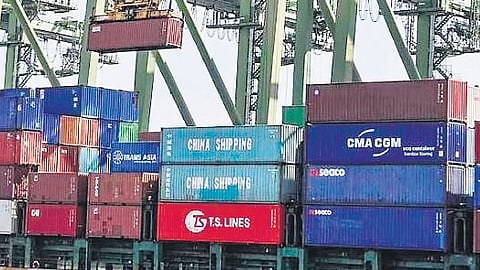

It's unfortunate that both trade and terror have moved onto India's front porch at once. But the Asian tiger isn't timid, and seems ready to assert its toughness.
As for the trade deal with the US, we can touch some good cards and turn over, but it's the terror troubles from neighboring Pakistan that's likely to drag the country into a war zone.
Following the horrific killing of Hindu tourists in Pahalgam, the government appears determined to hold its feet to the fire and bring justice. While India is chalking out an appropriate military response and is yet to announce its decision to dig in for a fight, it has already launched a series of diplomatic missiles towards Pakistan.
It yanked out the Indus Water Treaty hitting Pakistan's agricultural backbone, shut its airspace to Pakistani air carriers, closed the crucial Attari-Wagah crossing, cancelled visas under the Saarc Visa Exemption Scheme besides others.
And as widely known, trade is often the first casualty when tensions escalate, and so naturally India renewed its vows to halt trade with Pakistan, which was once our largest trading partner.
For instance, in 1948-49, some 63% of India's exports went to Pakistan, while about 70% of Pakistan's trading transactions were with India.
Currently though, formal bilateral trade between India and Pakistan is nothing but bacon bits. Still, the pullback is expected to put pressure on Pakistan's already fragile economic growth, which the IMF had revised downwards to 2.6% citing the impact of US tariffs. Further, it warned that increasing global trade tensions would could push Pakistan into a deeper economic crisis.
India exports essential medicines, chemicals, fruits, vegetables, poultry feed, and dry fruits and the suspension of trade will lead to food shortages for ordinary citizens in Pakistan. Coming in the backdrop of global trade headwinds, India's move halting trade is like putting an anorexic on a diet potentially resulting in irreversible consequences.
From India's perspective however, Pakistan isn't really a paradise for commerce and accounts for a miniscule portion of our overall trade. The India-Pakistan bilateral trade shrunk to about $2 billion annually, a tiny fraction of the $37 billion trade potential estimated by the World Bank. If India’s overall goods trade stands at $430 billion, Pakistan’s is approximately $100 billion. Moreover, political instability, and depleting foreign reserves further make a strong case to avoid even considering Pakistan as a potential market.
Incidentally, trade embargos aren't new and have been a common practice.
Following the war in 1965, trade halted for nearly a decade till 1974. More recently, after the Pulwama attack in 2019, India slapped an import duty of 200% -- effectively banning imports -- besides invoking the Most Favoured Nation (MFN) status to Pakistan, which it granted in 1996. It's baffling that even after decades of trade relations, Pakistan hasn't reciprocated granting India the MFN status. Under the MFN pact, a World Trade Organization member country is obliged to treat the other trading nation in a non-discriminatory manner, especially with regard to customs duty and other levies.
So in 2019, trade came to a griding halt and since then, there's been a steep decline in bilateral trade with the trade volume falling from $3 billion in 2018 to about $1.2 billion by 2024. Between April, 2024 and January, 2025, India exported goods worth just $500 million to Pakistan, mainly consisting of pharmaceuticals, chemicals, sugar, and auto parts, while imports stood at $0.42 million, according to estimates by trade body per Confederation of All India Traders (CAIT).
In FY23, India's foreign trade reached $1.6 trillion. Out of which, exports to Pakistan stood at a mere $627 million, or 0.1% of total exports, while $20 million worth imports accounted for just about 0.003% of India's total imports. Even prior to the FY19 trade ban, India's export to Pakistan comprised 0.6% of our total exports, while imports stood at 0.096%.
India's exports to Pakistan in April-January FY25 stood at $447.65 million, while imports were meagre $0.42 million. Exports and imports in FY24 were $1.18 billion and $2.88 million, respectively. In FY23 and FY22, India exported goods worth $627 million and $513.82 million and imported products worth $20.11 million and $2.54 million, respectively.
Pakistan's imports from India stood at around $305 million in 2024, based on data from the UN COMTRADE database that tracks global trade flows. A significant chunk of this import value came from just two categories: organic chemicals and pharmaceutical products. However, informal trade between both the countries continued to flourish, thanks to re-routing goods through a third country. According to estimates by the economic think tank Global Trade Research Initiative (GTRI), Indian goods worth over $10 billion are reaching Pakistan every year indirectly through ports such as Dubai, Singapore, and Colombo, bypassing trade restrictions.
According to GTRI, Indian businesses send goods to ports, where an independent company offloads the consignment, keeps the products in bonded warehouses, where goods are stored without paying duties while in transit, their labels and documents modified to show a different country of origin and are shipped to countries like Pakistan.
Interestingly, both India and Pakistan now seem to be willing to sling their hook and snap even indirect trade channels. While CAIT vowed to cease trade with Pakistan, and advocated for an immediate all-out boycott halting all imports and exports to and from Pakistan, the latter declared that it'll also halt indirect trade through third countries such as Dubai and Singapore, from where goods worth some $5 billion to $10 billion are being traded.